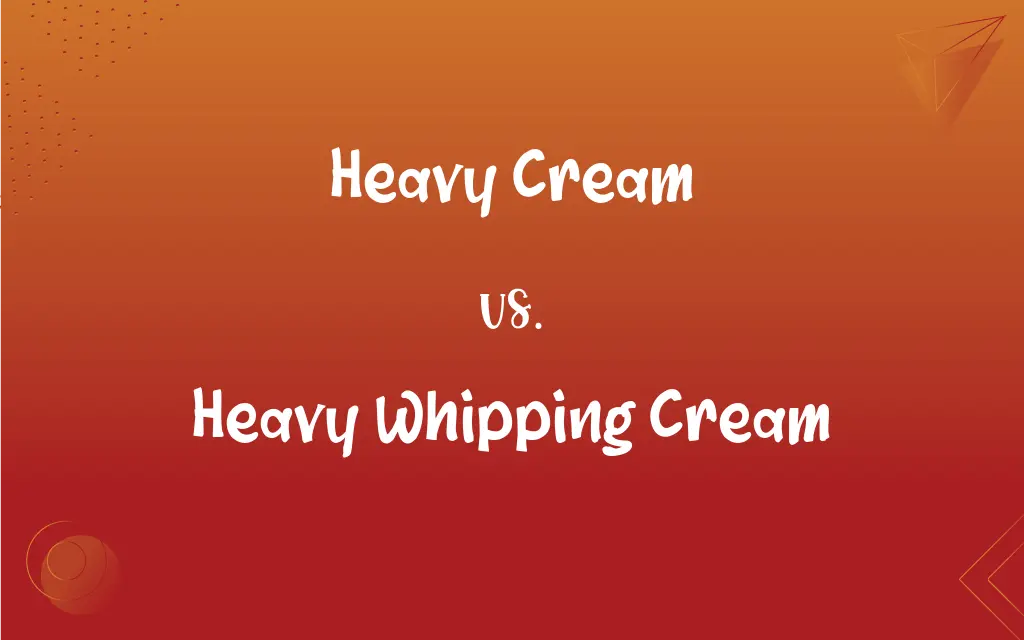Heavy Cream vs. Heavy Whipping Cream: What's the Difference?
Edited by Janet White || By Harlon Moss || Updated on October 4, 2023
Heavy cream contains slightly more fat than heavy whipping cream, but both are rich dairy products used in cooking and baking.

Key Differences
Heavy cream and heavy whipping cream are both high-fat dairy products often found in supermarkets. Heavy cream typically contains slightly more fat, usually around 36% or more, which gives it a richer texture. On the other hand, heavy whipping cream usually contains between 30% to 36% fat. This fat content is what allows both to be whipped into whipped cream, though the results can differ in texture and stability.
In the culinary world, heavy cream is often sought after for its rich and creamy consistency, making it perfect for sauces, soups, and desserts. Heavy whipping cream, with its slightly lower fat content, is designed to be whipped, and it holds its shape better once whipped, making it the preferred choice for toppings and fillings.
While both heavy cream and heavy whipping cream can be used interchangeably in most recipes, there might be slight variations in the end product's consistency and taste. For instance, using heavy cream instead of heavy whipping cream in a whipped dessert might result in a denser texture. Conversely, using heavy whipping cream in a creamy sauce might yield a slightly lighter consistency than desired.
Though the distinction between the two might seem minimal, for professional chefs and baking enthusiasts, the choice between heavy cream and heavy whipping cream can make a subtle yet significant difference in a dish's outcome. Regardless, both are fundamental ingredients in a variety of delicious culinary creations.
Comparison Chart
Fat Content
Typically around 36% or more fat.
Usually between 30% to 36% fat.
ADVERTISEMENT
Primary Use
Soups, sauces, and desserts.
Whipping into whipped cream for toppings/fillings.
Consistency When Whipped
Richer and might be less stable.
Holds shape better due to less fat.
Taste and Texture
Richer taste and creamier texture.
Lighter in taste and texture.
Interchangeability in Use
Can be used interchangeably in most recipes.
Can be used interchangeably in most recipes.
Heavy Cream and Heavy Whipping Cream Definitions
Heavy Cream
Used to add creamy texture to dishes.
The soup's velvety texture was thanks to the heavy cream.
ADVERTISEMENT
Heavy Whipping Cream
A dairy product containing 30% to 36% fat.
The pie was topped with freshly whipped heavy whipping cream.
Heavy Cream
Can be a base for butter.
I churned the heavy cream until it turned into butter.
Heavy Whipping Cream
Less fat content than heavy cream.
The sauce was light since I used heavy whipping cream.
Heavy Cream
Found in supermarkets and essential for many recipes.
Make sure to buy heavy cream for the cheesecake recipe.
Heavy Whipping Cream
Designed to be whipped for toppings and fillings.
I used heavy whipping cream for the cake's frosting.
Heavy Cream
A dairy product with around 36% or more fat.
I added heavy cream to the pasta sauce for richness.
Heavy Whipping Cream
Can be used in cooking, but ideal for whipping.
For a fluffy texture, use heavy whipping cream in your desserts.
Heavy Cream
Less suitable for whipping than heavy whipping cream.
The dessert was dense because I used heavy cream instead of whipping cream.
Heavy Whipping Cream
Used in a variety of sweet and savory dishes.
I folded heavy whipping cream into the chocolate mousse for a silky finish.
FAQs
Is heavy whipping cream ideal for sauces?
While it can be used, heavy cream might give a creamier texture.
Can I use heavy cream to make whipped cream?
Yes, but it may result in a richer and denser whipped cream.
Why is fat content important in these creams?
Fat content determines the cream's consistency, taste, and whipping ability.
Are they both suitable for baking?
Yes, but the choice depends on the desired texture and richness of the baked good.
Can they be frozen?
Yes, but there might be a change in texture upon thawing.
Are there lactose-free versions available?
Yes, some brands offer lactose-free versions of both creams.
What is heavy cream?
Heavy cream is a dairy product with around 36% or more fat.
How does heavy whipping cream differ from heavy cream?
Heavy whipping cream has 30% to 36% fat, slightly less than heavy cream.
Can both be used in coffee?
Yes, depending on personal preference for richness.
Can I make heavy cream at home?
Not exactly, as it's a result of milk separation processes.
Why is heavy whipping cream preferred for toppings?
It whips better and holds its shape due to its specific fat content.
Can I turn heavy cream into butter?
Yes, by churning it, heavy cream can be transformed into butter.
Is there a vegan substitute for these creams?
Yes, coconut cream or cashew cream can be alternatives.
Can I substitute one for the other in recipes?
In most cases, yes, but there might be slight texture and taste differences.
Which cream is richer in taste?
Heavy cream is generally richer due to its higher fat content.
Do both creams have the same calorie count?
No, heavy cream has slightly more calories due to its higher fat content.
Can I use heavy whipping cream in soups?
Yes, but it will be slightly less creamy than with heavy cream.
How are they produced?
Both are separated from milk, with different processes to achieve varying fat content.
How should I store these creams?
In the refrigerator, and use within the recommended date.
Which one is better for making ice cream?
Heavy cream, for a richer and creamier ice cream.
About Author
Written by
Harlon MossHarlon is a seasoned quality moderator and accomplished content writer for Difference Wiki. An alumnus of the prestigious University of California, he earned his degree in Computer Science. Leveraging his academic background, Harlon brings a meticulous and informed perspective to his work, ensuring content accuracy and excellence.
Edited by
Janet WhiteJanet White has been an esteemed writer and blogger for Difference Wiki. Holding a Master's degree in Science and Medical Journalism from the prestigious Boston University, she has consistently demonstrated her expertise and passion for her field. When she's not immersed in her work, Janet relishes her time exercising, delving into a good book, and cherishing moments with friends and family.
































































